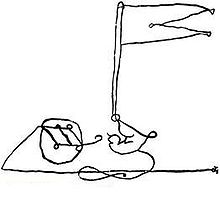- Solomon Molcho
-
Solomon Molcho 
Stylized signature of Solomon Molcho.
Source: Manuscript owned by the Alliance Israélite UniverselleBorn Diogo Pires
1500
PortugalDied 13 December 1532 (aged 32)
Mantua, ItalyCause of death Executed (burning at stake) Solomon Molcho (Hebrew: שלמה מולכו Shelomo Molkho, originally Diogo Pires, (1500 – 13 December 1532) was a Portuguese mystic and pseudomessiah.[1] A "New Christian" who converted back to Judaism, Molcho declared himself the Messiah, and was burned at the stake for apostasy.
Contents
Early life
Molcho was born a Christian to Marrano parents in Portugal about 1500. His baptismal name probably was Diogo Pires. He held the post of secretary in one of the higher courts of his native country. When the Jewish adventurer David Reubeni came ostensibly on a political mission from Khaibar (Peshawar) to Portugal, Molcho wished to join him, but was rejected. He then circumcised himself, though without thereby gaining Reubeni's favor, and emigrated to Turkey.
Occult studies
Molcho was a believer in dream interpretation who studied the Kabbalah with Joseph Taitazak and became acquainted with Joseph Caro. He then wandered as a preacher through the Land of Israel (then a province of the Ottoman Empire), where he achieved a great reputation and announced that the Messianic kingdom would come in 1540. In 1529 Molcho published a portion of his sermons under the title Derashot, or Sefer ha-Mefo'ar. Going to Italy, he was opposed by prominent Jews including Jacob Mantino ben Samuel, who feared that he might mislead their co-religionists. He succeeded in gaining the favor of Pope Clement VII and of some Judeophile cardinals at Rome. He was said to have predicted a certain flood which inundated Rome and various other places. After his many cabalistic and other strange experiments, Molcho felt justified in proclaiming himself the Messiah, or his precursor.
Travels and martyrdom
In company with David Reubeni, whom he came across in Italy, he went in 1532 to Ratisbon, where the emperor Charles V was holding a diet. On this occasion, Molcho carried a flag with the Hebrew word Maccabi, the four letters מכבי which also signify an abbreviation for Exodus 15:11 "Who among the mighty is like unto God?".[2] The emperor imprisoned both Molcho and Reubeni, and took them with him to Italy. In Mantua an ecclesiastical court sentenced Molcho to death by fire. At the stake, the emperor offered to pardon him on condition that he return to the Catholic Church, but Molcho refused, asking for a martyr's death (5th of Tevet 5293 in the Hebrew calendar).
See also
References
- ^ Yosef Eisen, Miraculous journey: a complete history of the Jewish people from Creation to the present, Targum Press, Southfield, MI, 2004, p216.
- ^ Singer, Isidore; Bloch, Phillipp. "Molko, Solomon" in Jewish Encyclopedia. Funk and Wagnalls, New York. 1901-1906.
- Encyclopædia Britannica
 This article incorporates text from a publication now in the public domain: Chisholm, Hugh, ed (1911). "Molko". Encyclopædia Britannica (11th ed.). Cambridge University Press.
This article incorporates text from a publication now in the public domain: Chisholm, Hugh, ed (1911). "Molko". Encyclopædia Britannica (11th ed.). Cambridge University Press.- This article incorporates text from the 1901–1906 Jewish Encyclopedia, a publication now in the public domain.
External links
- The Jewish Museum of Prague preserves a robe and a flag of Molcho.
Categories:- 1500 births
- 1532 deaths
- Jewish Messiah claimants
- Jewish mysticism
- People executed by burning
- 16th-century Sephardi Jews
- Executed Portuguese people
- Portuguese Jews
- Victims of the Inquisition
- Conversos
- People executed by the Portuguese Inquisition
- People executed for apostasy
- Jewish martyrs
Wikimedia Foundation. 2010.
